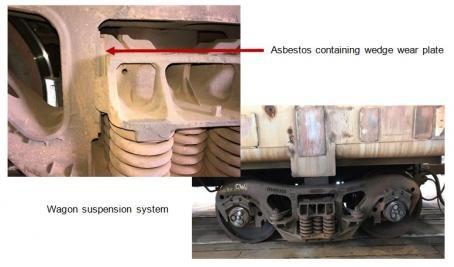Purpose
This safety alert is to warn of asbestos in rail carriage suspension system friction wear plates.
Background
These rail carriages were purchased and imported from China between 2007 and 2014. The wear plates on these rail carriages have not needed replacing since they were purchased. A National Association of Testing Authorities (NATA) accredited laboratory in Australia has conducted testing and found that the wear plates contain chrysotile (white) asbestos.

Contributing factors
The use of all forms of asbestos has been banned in Australia since the end of 2003. This means that the import, manufacture, supply, sale and use or reuse of asbestos and products with any level of asbestos in them is prohibited for import or use, except under very limited circumstances.
However, in many countries asbestos is still used in manufactured products. Certification that goods are asbestos-free, which is provided to importers from overseas manufacturers, is sometimes found to be incorrect under our regulations. Some countries may classify goods asbestos-free where they meet a certain low level of asbestos content.
Action required
The importer must ensure they do not import asbestos materials into Australia and suppliers must not supply asbestos materials. Both imports and suppliers must obtain testing certification that the goods are asbestos-free.
Importers should be aware of the varying definitions and standards applied in the country of origin and/or supply. Australian regulations apply at the border.
A test report from a National Association of Testing Authorities (NATA) accredited laboratory, or equivalent overseas body with a zero asbestos content result would be the best form of assurance. The NATA provides information on working with accredited asbestos facilities for import/export.
If adequate assurances are not provided, suppliers will face delays and be responsible for costs incurred when the rail carriage friction wear plates are held at the border for the purposes of sampling and testing. Importers should be familiar with the information on the Department of Immigration and Border Protection asbestos webpage.
To reduce the risk of importing or supplying products containing asbestos, read the fact sheet preventing goods or materials containing asbestos being supplied to workplaces in Queensland.
Information includes:
- how the importation of asbestos is regulated at the Australian border and the products at particular risk of containing asbestos
- what businesses must do to ensure imported products do not contain asbestos
- types of verifications that exist for Australian importers or consumers to show imported materials do not contain asbestos
- acceptable standards for testing if materials contain asbestos.